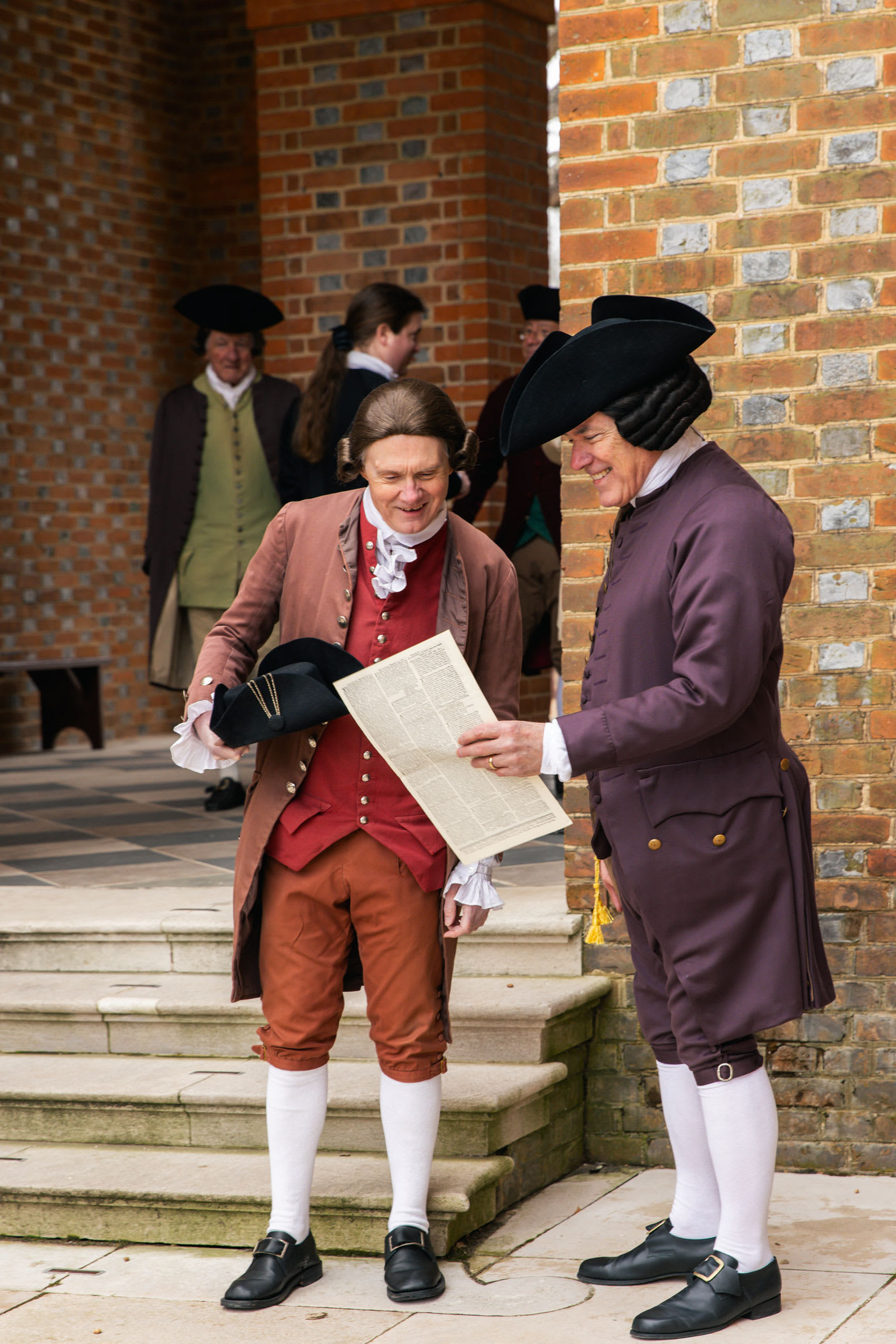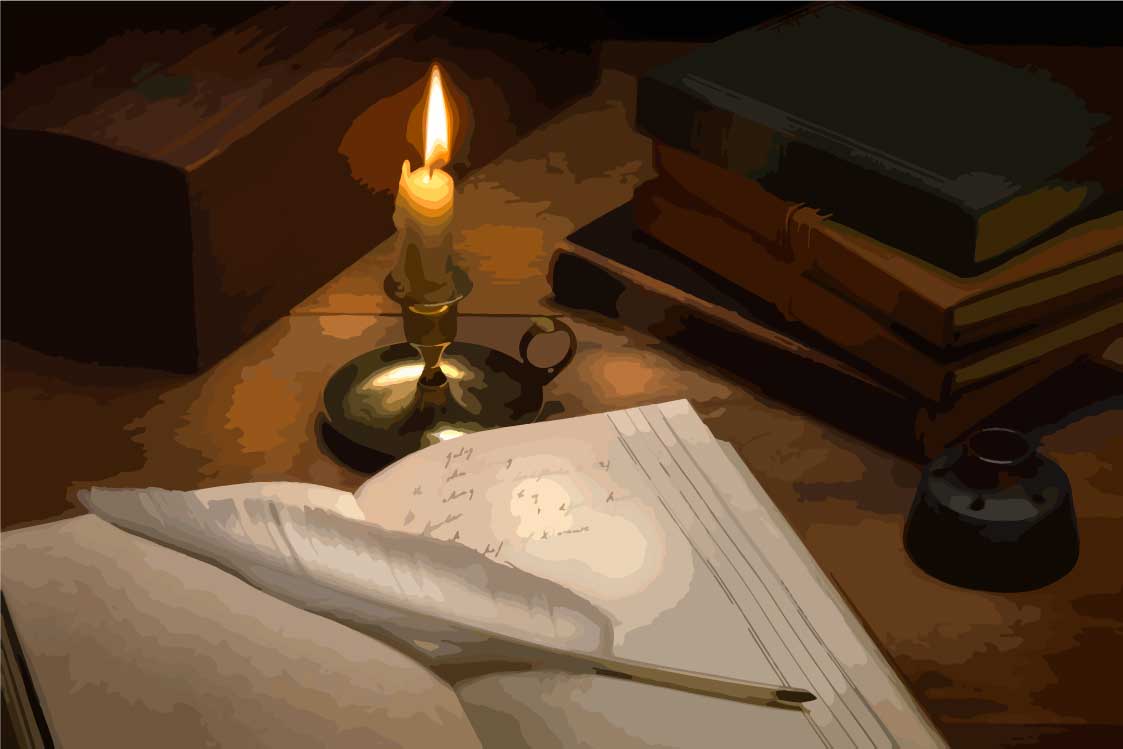Imagine throwing a party for someone whose husband just fired you. On the evening of May 27, 1774, the members of Virginia’s leading families gathered for a “Ball given by the House of Burgesses to Lady Dunmore.”1 Just the day before this event, though, Governor John Murray, the Fourth Earl of Dunmore, had dissolved Virginia’s House of Burgesses, relieving its members of their duties until new elections were held.
The Burgesses responded defiantly. The morning of the ball, they had convened as private citizens at the Raleigh Tavern to condemn the British government and call for an intercolonial meeting. We don’t know much about the ball that evening. But it’s hard to believe that it wasn’t tense. At the very least, Lady Dunmore had been upstaged.

Governor Dunmore’s dissolution of the House of Burgesses sparked a political crisis. In the aftermath, Virginia’s leaders began to defy the existing constitutional order and build new political systems for themselves. As the ball’s revelers bowed, danced, and drank late into the evening, they might have guessed, but could not have known, that they had set themselves on the road to revolution.

Echoes from Boston
In May 1773, the Parliament of Great Britain passed the Tea Act. Promising to strengthen enforcement of existing trade laws, the law sparked a fierce backlash in the colonies. A group of Bostonians dressed as Indigenous people famously tossed hundreds of chests of tea into their harbor to protest the act. News of the destruction of the tea (subsequently known as the Boston Tea Party) first appeared in the Virginia Gazette on January 6, 1774.

Colonists expected imperial leaders to respond to this bold act. But because of the sluggishness of eighteenth-century communications, it took months to learn what London planned. In May 1774, a full year after the passage of the Tea Act, Virginians finally heard that Parliament was planning to shut down Boston harbor. This decision came as a “shock of Electricity” to the Burgesses, who were in session when the news arrived. 2
A Day of Fasting, Humiliation, and Prayer
Thomas Jefferson’s autobiography is our best guide for what happened next. Furious with Parliament’s actions, a group of radical Burgesses including Jefferson, Patrick Henry, Richard Henry Lee, and Francis Lightfoot Lee met to discuss a response. They convened in the Council Chamber of the Capitol to use its library. Rummaging through the pages of a documentary history of the English Civil War, they found some useful “revolutionary precedents” in language used by the House of Commons in the 1640s. Based on this model, they “cooked up” a resolution urging Virginians to observe a day of fasting, humiliation, and prayer on June 1—the day that Boston Harbor was to be closed.3

Public days of fasting, humiliation, and prayer were common in the colonies, but especially in Congregationalist New England. On these days, colonists gathered in church all day to fast, listen to sermons, repent, and beg for God’s favor. Some fast days responded to natural events like an earthquake or drought. Others had a more political flavor.4 The radical Burgesses’ resolution was openly political. It suggested that Parliament’s actions threatened "destruction to our Civil Rights, and the Evils of Civil War,” and were “pregnant” with the “ruin” of the colonies. The Burgesses called for colonists to use the fast day to seek God’s help in protecting “American Rights” and inspiring “Wisdom, Moderation, and Justice” in London.5 Jefferson hoped that this event would arouse “our people from the lethargy into which they had fallen.”6 The House of Burgesses passed the resolution with little or no opposition on May 24.7

After approving the day of fasting, humiliation, and prayer, the Burgesses returned to the colony’s routine business. They took up matters relating to the public printer, ferry lines, land disputes, tobacco inspection warehouses, and the management of parish preachers. The most important matter pending before the Burgesses concerned a bill for funding the courts, which had expired the previous month.8 Richard Henry Lee had believed that Dunmore would not dissolve them until this crucial “public business” was resolved. They planned to pass a few other, more “spirited” resolutions as soon as these matters were closed.9
But Dunmore surprised the Burgesses. The day after the fast day resolution passed, he asked the colony’s Council if he should dissolve the Burgesses. According to the secondhand account of a wealthy planter named Landon Carter, each time he asked, they “observed Profound Silence.” Dunmore took their silence as approval.10 Later, a letter from the Council to Dunmore admitted that they had “advised your Excellency dissolve the Assembly.”11 In any case, it appears that they offered no opposition.

The next day, on May 26, Dunmore summoned the Burgesses to the Council chamber. With nearly a hundred Burgesses crowded into the Council Chamber and the hallway outside, Dunmore announced that he was dismissing them:
I have in my hand a Paper published by Order of your House, conceived in such Terms as reflect highly upon [i.e., reproach] his Majesty and the Parliament of Great Britain; which makes it necessary for me to dissolve you; and you are dissolved accordingly. 12
Reaction at Raleigh Tavern

Dunmore’s decision to dissolve the Burgesses was an unusual event in Virginia politics. But it was far from unprecedented. Dunmore’s predecessors had dissolved the Burgesses on several occasions. In 1769, Governor Botetourt had dismissed the House for rejecting Parliament’s authority to tax them. On that occasion, the Burgesses had met at the Raleigh Tavern’s Apollo Room to express their grievances.13
Perhaps thinking back to that event five years earlier, in 1774 the Burgesses returned to the Raleigh Tavern to plan a response. On May 27, they signed an “Association,” which protested taxation without representation, announced a boycott of some British goods, and directed the Virginia committee of correspondence to organize a “general congress” of representatives from across the British colonies.

A few days later, on May 30, a circular letter from Boston proposing a halt to all trade with Britain arrived in Williamsburg. Most of the 89 Burgesses who had signed the Association had left town by then. But 25 remaining Burgesses agreed to convene another meeting in August—without the governor or Council—to consider the proposed boycott. This was the first of five extralegal gatherings that would become known as the Virginia Conventions. 14
Conclusion
At the Council’s urging, Dunmore reluctantly called new elections three weeks after dissolving the House of Burgesses.15 Though these elections were held, Dunmore repeatedly refused to allow the newly elected Burgesses to meet.16 With the government unable to pass a funding bill, Virginia’s civil courts remained closed.

Over the next year, the House of Burgesses ceased to function as a representative body. It was only when the colony descended into crisis in mid-1775 that Dunmore allowed them to reconvene. But then he fled Williamsburg a week later. The Burgesses spent the next few weeks exchanging barbed letters with him. Afterward, gatherings of the Burgesses were unable to reach a quorum to conduct business.17
Unable to express their protests or govern effectively through the House of Burgesses, Virginia’s revolutionaries built new political institutions. The Association signed at the Raleigh Tavern explained that extraordinary steps were necessary since the dissolution had prevented the Burgesses from “giving our countrymen the advice we wished to convey to them in a legislative capacity.”18 As the Burgesses later explained to Dunmore, his dissolution and his refusal to allow the Burgesses to meet had made the Virginia Convention meetings “absolutely necessary.”19 Revolutionary Virginians first began to imagine new forms of self-governance in the void left by a dysfunctional and dissolved House of Burgesses. The dissolution crisis of 1774 was the beginning of the end of royal government in Virginia.
Learn More
Sources
- “[May 1774],” Founders Online, National Archives, https://founders.archives.gov/documents/Washington/01-03-02-0004-0009.
- Richard Henry Lee to Arthur Lee, June 26, 1774, in The Letters of Richard Henry Lee, ed. James Curtis Ballagh, vol. 1, 1762-1778 (New York: The MacMillan Company, 1911), 114, link.
- Jefferson recalled, “The lead in the house [of Burgesses] on these subjects being no longer left to the old members, Mr. Henry, R. H. Lee, Fr. L. Lee, 3. or 4. other members, whom I do not recollect, and myself, agreeing that we must boldly take an unequivocal stand in the line with Massachusetts, determined to meet and consult on the proper measures.” Thomas Jefferson, Autobiography of Thomas Jefferson, 1743–1790 (New York: G. P. Putnam’s Sons, 1914), 11, link. On Rushworth and the fast day precedents, see notes in “Resolution of the House of Burgesses Designating a Day of Fasting and Prayer, 24 May 1774,” Founders Online, National Archives, https://founders.archives.gov/documents/Jefferson/01-01-02-0082.
- On days of fasting and thanksgiving in Congregationalist New England, see James W. Baker, Thanksgiving: The Biography of an American Holiday (Lebanon: University of New Hampshire Press, 2009), 17–21.
- John Pendleton Kennedy, ed., Journals of the House of Burgesses of Virginia 1773–1776 including the records of the Committee of correspondence (Richmond: E. Waddey Co., 1905), 124, link.
- Jefferson, Autobiography of Thomas Jefferson, 11, link.
- Jefferson claimed that it passed “without opposition.” Jefferson, Autobiography of Thomas Jefferson, 12, link. Robert Carter Nicholas wrote that there was “not above one Dissentient appearing amongst near an Hundred Members.” [Robert Carter Nicholas], “‘Considerations on the Present State of Virginia’ Examined,” in Earl Gregg Swann, ed., Considerations on the Present State of Virginia, Attributed to John Randolph, Attorney General, and Considerations on the Present State of Virginia Examined by Robert Carter Nicholas (New York: Charles F. Heartman, 1919), 80, link.
- Kennedy, ed., Journals of the House of Burgesses of Virginia 1773–1776, 123–26, link; “An Act for further continuing and amending the act intituled, An act for the better regulating and collecting certain officers fees, and for other purposes therein mentioned, February 1772,” in William Waller Hening, ed., The Statutes at Large; being a collection of all the laws of Virginia, from the first session of the legislature, in the year 1619, 13 vols. (Richmond: J. & G. Cochran, 1821), 8:515–16, link. On the impact of the funding bill’s expiration, see Richard Henry Lee to Arthur Lee, June 26, 1774, in Letters of Richard Henry Lee, ed. Ballagh, 114, link.
- The fast day resolution could not be as easily delayed, since it was intended to coincide with the closure of Boston harbor. On the additional resolutions, see Letters of Richard Henry Lee, ed. Ballagh, 111–12, link.
- Landon Carter, The Diary of Colonel Landon Carter of Sabine Hall, 1752–1778, ed. Jack P. Greene, vol. 2 (Richmond: Virginia Historical Society, 1987), 818.
- Letter from Virginia Council to Lord Dunmore, June 18, 1774, enclosed within “Letter from Lord Dunmore to Lord Dartmouth transmitting a petition of the council's concern regarding fees,” June 16–20, 1774, CO 5/1352, National Archives, London, UK.
- Kennedy, ed., Journals of the House of Burgesses of Virginia 1773-1776, 132, link.
- Lucille Griffith, The Virginia House of Burgesses, 1750–1774 (University, Ala.: University of Alabama Press, 1970), 47–48; Jefferson, Autobiography of Thomas Jefferson, 9.
- H. R. McIlwaine, ed., Legislative Journals of the Council of Colonial Virginia, 3 vols. (Richmond: Virginia State Library, 1918–19), 3:1589, link; John E. Selby, The Revolution in Virginia, 1775–1783 (Williamsburg: Colonial Williamsburg Foundation, 1988), 9.
- Benjamin J. Hillman ed., Executive Journals of the Council of Colonial Virginia, vol. 6, June 20, 1754-May 3, 1775 (Richmond: Virginia State Library, 1966), 577–58, link.
- Kennedy, ed., Journals of the House of Burgesses of Virginia 1773–1776, 165–67, link.
- Kennedy, ed., Journals of the House of Burgesses of Virginia 1773–1776, 283, link.
- “An Association, signed by 89 members of the late House of Burgesses,” broadside (1774), Colonial Williamsburg Foundation Rockefeller Library Special Collections, link.
- Kennedy, ed., Journals of the House of Burgesses of Virginia 1773–1776, 256, link.



